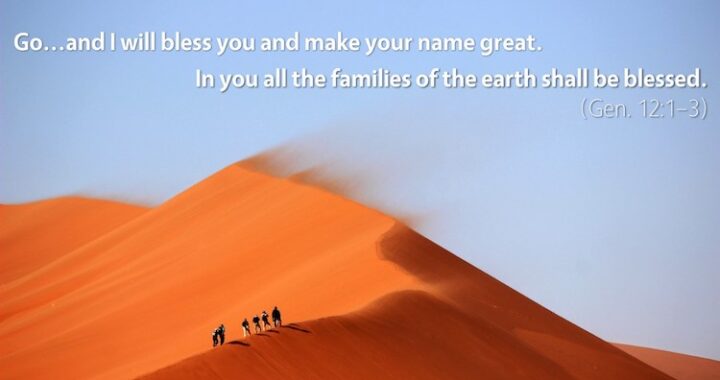Life is a series of choices and the outcome of one’s life is highly dependent on how one responds to the choices that he or she encounters along the way. The life of Abraham is a great illustration of a man who chose well throughout his long and full life. This week’s Torah Portion is called לך לך – Lech Lecha – “Go forth” which begins to unfold for us the series of choices to which Abraham responded throughout his 175 years on this earth.
We know that Abraham (originally called Abram) was born in Ur of the Chaldeans (located in southern Iraq) and then traveled with his father to Haran (Gen. 11:27-32). It was in Haran that the LORD spoke to Abraham and give him the following charge:
Now the LORD said to Abram, “Go from your country, and from your relatives and from your father’s house, to the land which I will show you; and I will make you into a great nation, and I will bless you, and make your name great; and you shall be a blessing; and I will bless those who bless you, and the one who curses you I will curse. And in you all the families of the earth will be blessed.” So Abram went away as the LORD had spoken to him; and Lot went with him. Now Abram was seventy-five years old when he departed from Haran. – Gen. 12:1-4
Abraham obeyed the word of the LORD that was spoken to him and went to the new land that the LORD would show him.
The amazing promises of the LORD to Abraham in the above verses remind us that there is great blessing in obeying the word of the LORD. God promised to bless Abraham and he only needed to believe the word of the LORD, however, in order to see the Land that God would give to his descendants, Abraham needed to obey the word of the LORD and cross the great river, the River Euphrates.
Haran is located in Northern Mesopotamia, just to the east of the Euphrates River. In order to arrive in the new land of Canaan, Abraham and his clan needed to forge the great River Euphrates and travel south to the land of Canaan and this is exactly what they did:
Abram took his wife Sarai and his nephew Lot, and all their possessions which they had accumulated, and the people which they had acquired in Haran, and they set out for the land of Canaan; so they came to the land of Canaan. Abram passed through the land as far as the site of Shechem, to the oak of Moreh. Now the Canaanites were in the land at that time. – Gen. 12:5-6
Abraham, Sarai, and his nephew Lot were strangers in a foreign land but Abraham made the choice to obey the word of the LORD which he spoke to him.

Abraham the Hebrew
As a result of Abraham making the choice to cross the Euphrates River and to dwell in the land of Canaan, Abraham was the first one in the Bible to be called a Hebrew, as we read in Genesis chapter fourteen:
Then a survivor came and told Abram the Hebrew. Now he was residing by the oaks of Mamre the Amorite, brother of Eshcol and brother of Aner, and they were allies with Abram. – Gen. 14:13
The word Hebrew is the word עברי – Ivri and comes from the root word עבר – Avar – to go beyond or cross over. Gaining the title of “Abram the Hebrew” was probably a nickname given to Abraham to distinguish him as the leader of his clan who crossed over the great river.
The descriptive name of Abraham as the Hebrew, “one who crossed over,” carries with it tremendous spiritual status beyond just being a pioneer who crossed the river. Abraham obeyed the word that God spoke to him and went to the land where God told him to go. Abraham not only obeyed God by going to the land of Canaan but one of the first actions of Abraham in the new land was an act of devotion to the LORD:
And the LORD appeared to Abram and said, “To your descendants I will give this land.” So he built an altar there to the LORD who had appeared to him. – Gen. 12:7
Throughout the journeys of Abraham in the Land of Promise we see a consistent lifestyle of one who obeys the voice of the LORD and worships Him along the way. Abraham made good choices by obeying God’s voice, worshipping the LORD with His life, and the LORD blessed Him abundantly.
Lessons From the Life of Abraham
Abraham was chosen by God and God promised to bless Abraham but Abraham still had a choice as to how he would live his life. The life of Abraham in the Promised Land sets him in contrast to the life he left behind on the other side of the river as we read in the book of Joshua:
Then Joshua gathered all the tribes of Israel at Shechem, and called for the elders of Israel, their heads, their judges, and their officers; and they presented themselves before God. Joshua said to all the people, “This is what the LORD, the God of Israel says: ‘From ancient times your fathers lived beyond the Euphrates River, namely, Terah, the father of Abraham and the father of Nahor, and they served other gods. Then I took your father Abraham from beyond the Euphrates River and led him through all the land of Canaan, and multiplied his descendants and gave him Isaac. – Joshua 24:1-3
By bringing Abraham across the river, God separated Abraham from the idolatry of his forefathers. Abraham obeyed the word of the LORD, entered the Land of Promise, and chose to only worship the LORD.
The spiritual example of the life of Abraham reminds us that each and every one of us has the choice to answer the call of the LORD. God calls us to cross the Great River of this world, to leave the world of idolatry and sin behind, and to worship Him alone. It is not enough to simply obey and cross the river in making the decision to enter the spiritual “Promised Land.” The real choice is when we continue to make that decision everyday to serve and worship the LORD alone.

Blessing Beyond The River
When Joshua gathered the Israelites together at Shechem, approximately 600 years after Abraham, he recounted to them how God not only fulfilled His promise to Abraham but also to those with Joshua at that time by bringing them into the Promised Land. As Joshua continued to share the word of the LORD to the Israelites he reminded them that it was the power and blessing of God that brought them to this place:
You crossed the Jordan and came to Jericho; and the citizens of Jericho fought against you, and the Amorite, the Perizzite, the Canaanite, the Hittite, the Girgashite, the Hivite, and the Jebusite. Therefore I handed them over to you. Then I sent the hornet before you and it drove out the two kings of the Amorites from you—not by your sword nor your bow. And I gave you a land on which you had not labored, and cities which you had not built, and you have lived in them; you are eating of vineyards and olive groves which you did not plant.’ – Joshua 24:11-13
It was the blessing of the LORD that the Israelites were experiencing first hand as they conquered and settled the Land that God promised to Abraham centuries before. The Israelites needed to constantly remember that it is the LORD God who goes before them and not rely on their own strength and might.
At the conclusion of sharing the word of the LORD, Joshua then presented the following challenge to the people of Israel by declaring to them that they had a choice to make, a choice regarding the spiritual path forward:
“Now, therefore, fear the LORD and serve Him in sincerity and truth; and do away with the gods which your fathers served beyond the Euphrates River and in Egypt, and serve the LORD. But if it is disagreeable in your sight to serve the LORD, choose for yourselves today whom you will serve: whether the gods which your fathers served, which were beyond the Euphrates River, or the gods of the Amorites in whose land you are living; but as for me and my house, we will serve the LORD.” – Joshua 24:14-15
Just like Abraham, the Israelites who entered the Promised Land centuries after Abraham needed to choose whom they would serve and worship!
It was not enough to simply be apart of the generation who entered and dwelt in the Promised Land. Being in the right location physically without the proper conviction spiritually is meaningless. Joshua reminded the people that idolatry is everywhere:
-
Idolatry was on the other side of the Euphrates River in the land of their forefathers
-
Idolatry was in the land of Egypt where their ancestors lived for 400 years
-
Idolatry was also in the Promised Land among the natives at that time.
The Israelites could not ignore the temptation of idolatry and the worship of false gods that was pervasive in the world. They had to choose to be steadfast in their dedication and worship the LORD alone!

“…As For Me And My House…”
The life of Abraham together with the Israelites gives us a beautiful picture of the choice that each one us has in this life to cross the river, to enter the Promised Land, and to choose to serve the LORD. We all must make that decision to give our life to God in a way that is complete and holy. Once we have made that decision we must be careful to guard against all forms of idolatry and live a life of worship to Him alone. Paul gave the following challenge to the believers at Rome 2000 years ago:
Therefore I urge you, brothers and sisters, by the mercies of God, to present your bodies as a living and holy sacrifice, acceptable to God, which is your spiritual service of worship. And do not be conformed to this world, but be transformed by the renewing of your mind, so that you may prove what the will of God is, that which is good and acceptable and perfect. – Romans 12:1-2
This challenge is still equally relevant to us today. As we wake up each morning and face the decisions of each day, we must choose to worship the LORD with our lives so that we too can experience the blessing beyond the river!
Shabbat Shalom!
If you enjoyed reading this article, share it today with friends! We also invite you to sign up for our weekly Torah Portion commentary on the sidebar to the right.
Help keep our weekly commentaries free and available to all. Click here to donate today:
*All Scripture take from NASB Copyright © 1960, 1962, 1963, 1968, 1971, 1972, 1973, 1975, 1977, 1995 by The Lockman Foundation
**The Hebrew name “Yeshua” is used in the biblical quotations in place of the English name “Jesus” to give emphasis to the meaning of this name, salvation. The word “Messiah” is also used in place of the word “Christ” to bring clarity to the office of Yeshua.


